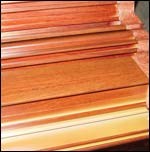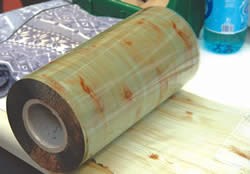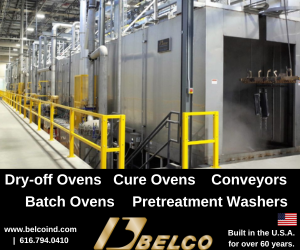Sublime Finishes
Vertical powder coating and sublimation printing combine to produce aluminum architectural pieces with unique finishes.
Vertical powder coating offers several advantages over traditional processes, including higher throughput, improved quality and reduced labor input. Despite these benefits, the process is just beginning to catch on in the United States.
But companies in Europe and elsewhere have taken advantage of the technology for some time. At Metra Group–Alcolors (Rodengo Saiano, Italy), they combine aluminum extrusion and vertical powder coating with a more labor-intensive sublimation printing process to produce aluminum sections with realistic wood grain finishes.
The company was one of several visited by a group of custom coaters from the United States last fall. Put together by Dupont Powder Coatings (Houston, TX) for members of its Star Coaters program (see sidebar), the trip gave participants an opportunity to tour custom coating operations in France, Belgium and Italy.
Alcolors produces more than 70,000 metric tons of anodized aluminum and 90,000 metric tons of painted aluminum profiles annually using large vertical lines, a horizontal line and a smaller job line.
In sublimation or hot printing, high-temperature processing results in the transfer of gaseous pigment molecules from the paper backing on which they are printed onto a primer layer.
The Process
At Alcolors, the process begins with degreasing, pickling and neutralization, followed by conversion coating. This is followed by a light base coat of powder primer.
According to DuPont’s Luigi D’Argenio, the primer material is a “reinforced” polyurethane-based material having a small amount of pigments and high UV and weathering resistance. After curing for 20 minutes at 200°C, the primer consists of a thin layer of amorphous oxide with paint. Alcolors says this hardens the end product and protects the aluminum against UV, weathering, abrasion, corrosion and moisture.
The primed aluminum sections are overlaid with a film printed with light-sensitive organic pigments and cellulose resins, then workers bag the parts for vacuum processing. At Alcolors, available wood-grain finishes on sublimated products include hazelnut, cherry, oak, Douglas fir and pine.
Bagged sections are connected to the vacuum circuit using attachments on the frame of a cart or trolley. Pulling a vacuum allows the film to adhere all over the section. Then the trolley, which can contain up to 15 workpieces, is placed inside a furnace where sublimation—a physical process causing the pigment molecules to be transformed directly from a solid to a gaseous state—takes place. Cycle time for this stage is three minutes at 195°C.
At the end of the heating cycle, the trolley leaves the furnace automatically and the vacuum pump stops. Re-introduction of air allows the plastic film that previously held the pigments to easily come away from the finished sections.
D’Argenio says removal of the film is very easy if the primer quality is good. Parts are finished when they’re removed from the bags, and no clear top coat is needed, he adds.
Related Content
Powder Coating 4.0: Smarter, Faster, More Efficient and Connected
New tools reduce cost and waste, lower manufacturing footprint of powder coating operations.
Read MoreMasking Solutions Provider CFS Dramatically Expands Capabilities and Capacity
Custom Fabrication & Supplies (CFS) completed a new plant expansion packing 10 times the capacity into twice the space. It dramatically enhances the supplier’s custom capabilities to provide extremely precise and cost-effective masking solutions.
Read MoreTTX’s Automated Conveyor Carrier System Offers Wireless, Flexible Operation
ACC system designed for reliable, consistent point-to-point movement of everything from small to heavy parts.
Read MoreConveyors and Paint Systems
Choosing the right conveyor system, coating technology, and ancillary equipment.
Read MoreRead Next
Episode 45: An Interview with Chandler Mancuso, MacDermid Envio Solutions
Chandler Mancuso, technical director with MacDermid Envio discusses updating your wastewater treatment system and implementing materials recycling solutions to increase efficiencies, control costs and reduce environmental impact.
Read MoreDelivering Increased Benefits to Greenhouse Films
Baystar's Borstar technology is helping customers deliver better, more reliable production methods to greenhouse agriculture.
Read MoreEducation Bringing Cleaning to Machining
Debuting new speakers and cleaning technology content during this half-day workshop co-located with IMTS 2024.
Read More
























